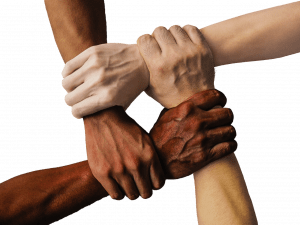The blurb says it all…
“First the teachers died, one by one. Then it began to infect the students, turning their bodies strange… left to fend for themselves on their island home, the girls don’t dare wander outside the school’s fence… they wait for the cure they were promised”.

jewhisperer / Pixabay – The enemy is invisible
Wilder Girls (2019) by Rory Power is a dystopian novel set in a boarding school on an island off the American seaboard. A strange, body transforming disease that infects all living life, lurks in the forest surrounding the school and has started to infect everything on the island. The authorities, worried about this disease leaking out, have shut down all access to the island leaving the girls to fend for themselves. With an eerie similarity to Golding’s Lord of the Flies, Wilder Girls highlights humanity’s anthropological need to set up a social hierarchy in the absence of an established system. But unlike Golding’s work, Power showcases the strength of human connectedness between the protagonist Hetty and her best friend Byatt. It is this robustness of this connection that spurs Hetty to search for her friend in the disease ridden woods.

sweetlouise / Pixabay – Being connected
Dystopian novels have always been traditionally favoured with teenagers. Marsden’s Tomorrow when the war began, Grant’s Gone, Roth’s Divergent, Dashner’s Maze Runner and Collin’s Hunger Games are just some examples of this genre and are all popular titles. Dystopian fiction has traditionally been based around conflict between an individual and society and often has fantastical elements. Their appeal to teens is based upon their ability to address inner angst in teenagers and rebellious ideologies (Basu, Broad & Hintz, 2013). Additionally, this genre allows the reader to make moral observations about society in general. In Power’s Wilder Girls, Hetty and Byatt have a physical altercation over an orange even though they are best friends. In their mind, it’s perfectly acceptable to resort to violence to obtain food, whereas to my mind, it seems abhorrent and distasteful. But I am not hungry, and in many parts of the world, people DO fight for food. In this way, Power points to the quick demise of social trappings of sophisticated society in times of survival and that actions and circumstances need to be evaluated together rather than in isolation. Remember, people were fighting over toilet paper in February and March 2020.

Alexas_Fotos / Pixabay – Toilet paper gate of 2020
Wilder Girls was outside my comfort zone as I originally picked it up as a bit of a lark due to the current COVID-19 pandemic. But whilst the book’s storyline itself was not to my liking ( pandemic and all, yes, I agree, completely wrong time to read this book!), I loved the way Power showcased the friendship between Hetty and Byatt. The sheer connection between these two girls gave Hetty the will to strike out into the unknown to look for her best friend amazed me and brought cheer to my spirit. It reminded me of the movie, Forrest Gump when Forrest went to look for Bubba in the jungles of Vietnam. I won’t tell you the ending of Wilder Girls but I will say that friendship matters.

truthseeker08 / Pixabay – Staying in touch
Peer relationships are important for teenagers, and for people of all ages. It is our relationships, and conflict within these associations with our friends and family that set up our social and emotional frameworks. Reading fiction covertly teaches the reader about emotional regulation that accompanies conflict. This regulation is essential for social development and human interactions and the ability to regulate such emotions is known as emotional literacy (Laurie, 2016). The reading of Wilder girls did not bolster my belief in #scottyfrommarketing to resolve the current COVID pandemic, but rather instead made me reach for my phone to text my girlfriends and say “Hey, I miss you”.
Basu, B. Broad, K.R., & Hintz, C. (2013). Contemporary dystopian fiction for young adults: Brave new teenagers. Oxfordshire, UK. Routledge. Retrieved from https://ebookcentral.proquest.com/lib/CSUAU/detail.action?docID=1186446
Laurie, H. (2016). Using picture books to promote social-emotional literacy. YC Young Children, Volume 71(3). pp80-86. Retrieved from https://www.naeyc.org/